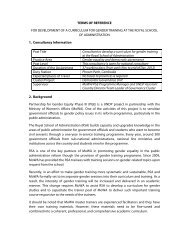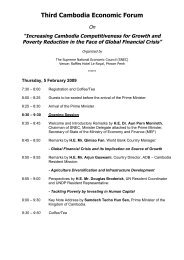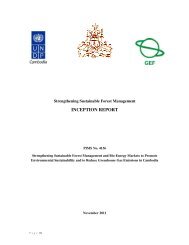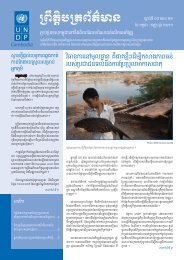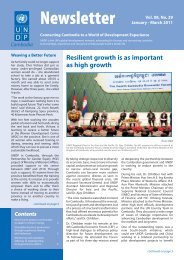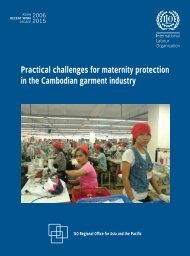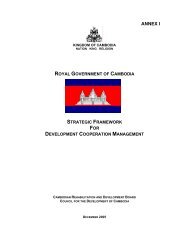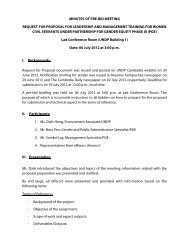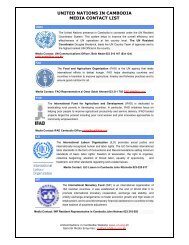Kreung Ethnicity - United Nations in Cambodia
Kreung Ethnicity - United Nations in Cambodia
Kreung Ethnicity - United Nations in Cambodia
You also want an ePaper? Increase the reach of your titles
YUMPU automatically turns print PDFs into web optimized ePapers that Google loves.
of the Rong house, they celebrate with a village sacrific<strong>in</strong>g ceremony (Sen Preh<br />
Rong) to mark the new village <strong>in</strong>auguration. They sacrifice at least one buffalo<br />
or cow, a pig and chickens and celebrate together followed by three days of krang.<br />
Sacrific<strong>in</strong>g for ra<strong>in</strong><br />
When the monsoon season is supposed to arrive but there is no ra<strong>in</strong>, the Krak<br />
Shrok and other Teungkang Krak gather to f<strong>in</strong>d a solution for the rice plants<br />
which are start<strong>in</strong>g to die. The solution is found <strong>in</strong> a ra<strong>in</strong> sacrifice request<strong>in</strong>g<br />
the spirits to br<strong>in</strong>g ra<strong>in</strong>. They perform this sacrific<strong>in</strong>g ceremony <strong>in</strong> accordance<br />
with the climate approximately every six to seven years. This entails a large<br />
ceremony where at least one buffalo is sacrificed. The celebration <strong>in</strong>cludes<br />
eat<strong>in</strong>g, dr<strong>in</strong>k<strong>in</strong>g, danc<strong>in</strong>g and s<strong>in</strong>g<strong>in</strong>g with gong music and cont<strong>in</strong>ues for three<br />
days. Krang is then observed for seven days. This sacrifice is considered more<br />
serious than others as even the villagers themselves (with the exception of<br />
women) are not allowed to go out of the village unless the Krak Shrok opens<br />
the gate. In addition, the villagers are not allowed to make loud noises,<br />
<strong>in</strong>clud<strong>in</strong>g cry<strong>in</strong>g, shout<strong>in</strong>g or conduct<strong>in</strong>g loud discussions. All the village<br />
entrance gates have signs prohibit<strong>in</strong>g entrance as mentioned earlier. Once aga<strong>in</strong>,<br />
if someone breaks these krang rules, s/he must be forced to pay tatch equal to<br />
the resources spent dur<strong>in</strong>g the sacrifice. This tatch is then used for re-sacrifice.<br />
Funerals<br />
When someone dies, the family will traditionally organise a funeral with<br />
participation from other villagers who come to comfort the family by play<strong>in</strong>g<br />
music, danc<strong>in</strong>g, eat<strong>in</strong>g and dr<strong>in</strong>k<strong>in</strong>g 19 until the day of burial. The funeral<br />
ceremony takes three, five or seven days depend<strong>in</strong>g on the resources available<br />
to the family. The body is buried <strong>in</strong> a forest not far from the village (about 500<br />
metres). On the day of the forest burial, there is a village prohibition on cutt<strong>in</strong>g<br />
trees, pick<strong>in</strong>g fruits, collect<strong>in</strong>g v<strong>in</strong>es and vegetables and engag<strong>in</strong>g <strong>in</strong> disputes<br />
or arguments. The villagers believe that someone who breaks these rules will<br />
get sick or have an accident. There is no tatch associated with break<strong>in</strong>g these<br />
19<br />
Villagers expla<strong>in</strong>ed that eat<strong>in</strong>g and dr<strong>in</strong>k<strong>in</strong>g together helps console the family and alleviate some of the<br />
collective sorrow felt.<br />
<strong>Kreung</strong> <strong>Ethnicity</strong>: Documentation of Customary Rules<br />
45



